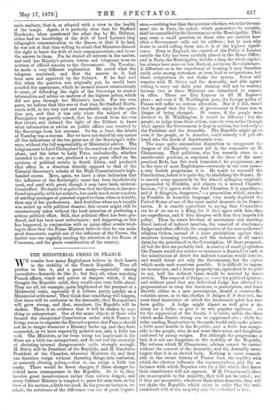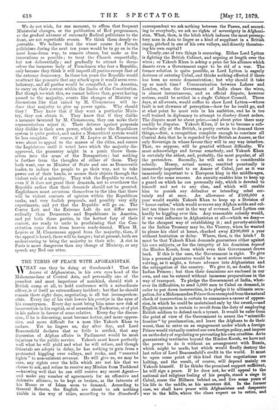THE MINISTERIAL CRISIS IN FRANCE.
WE wonder how many Englishmen believe in their hearts in the stability of the French Republic. They all profess to like it, and a great many—especially among journalists—honestly do like it ; but they all, when watching French affairs, wince and quiver at dangers which, if they thought the Republic solid, they would care very little about. They are all, for example, quite frightened at the prospect of a Ministerial crisis, especially if it follows pretty quickly on a Ministerial settlement. They think that something will happen, that there will be confusion in the Assembly, that Bonapartists will grow strong, and that, somehow, the Republic will be shaken. There is no evidence that it will be shaken by any- thing so unimportant. One of the many objects of those who framed the exceptional Constitution under which France is living, was so to organise the Executive power that France should not be in danger whenever a Ministry broke up, and they have succeeded, as we have repeatedly pointed out, only a little too well. The Ministers, so far from being too important in the State are a little too unimportant, and do not feel the necessity of obviating internal disagreements quite strongly enough. M. Grevy will be Presifient of the Republic, and M. Gambetta President of the Chamber, whatever Ministers do, and they can therefore resign without throwing things into confusion, or seriously altering policy,—that is, can resign a little too easily. There would be fewer changes, if those changes in- volved more consequences to the Republic. As it is, they involve great inconvenience rather than serious danger, and every. Cabinet Minister is tempted to press his own view, or the view of his section, a little too hard. In the present instance, we admit, the substance of the difference was one of great import- ance,—nothing less than the question whether, when the Govern- ment sits in Paris, the police, which guarantees its security, shall be controlled by the Government or the Municipality. That may seem a small question, to those who are careless how often a Government calls out its soldiers ; but to men who desire to avoid calling them out, it is of the highest signifi- cance. Even in England, the control of the Police of London outside the City has been carefully placed in the Home Office ; and in Paris, the Municipality, besides ruling the whole capital, has always been more or less Radical, not to say Revolutionary. A difference as to the expediency of trusting it may therefore easily arise among statesmen, or even lead to resignations, but those resignations do not shake the system. Power still remains with M. Grevy and the Assembly, and able agents willing to carry out their joint decision will not be wanting because two or three Ministers are disinclined to remain in office. There are fifty Leperes to fill M. Lepere's place ; and even if M. Waddington goes, the foreign policy of France will suffer no serious alteration. Nor if it did, would that be proof that the form of government in France was in danger of being changed. Of course, if the people were devoted to M. Waddington, it would be different ; but the people, to judge from their action, scarcely even notice through what agents the Government is kept in motion, but look only to the President and the Assembly. The Republic might go on even if the people, as in America, could scarcely tell you off- hand who the heads of departments were.
The same quite unconscious disposition to exaggerate the dangers of the Republic comes out in the comments on M. Clemencean. That politician, who has recently risen to a considerable position, as exponent of the ideas of the more practical Reds, has this week formulated his programme, and in the eyes of most Englishmen—certainly in our own eyes— a very foolish programme it is. He wants to remould the Constitution, before it is quite dry, by abolishing the Senate. He is carried away apparently by the absurd syllogism originally propounded by Franklin, and objects to a second Chamber because, "if it agrees with the first Chamber, it is superfluous, and if it disagrees, dangerous,"—a proposition which, couched by Franklin in homelier language, very nearly deprived the United States of one of the most useful elements in its Consti- tution. It is exactly equivalent to saying that Counsellors can be of no use to a King, for if they agree with him they are superfluous, and if they disagree with him they impede his policy. Then he wants freedom of association and meeting, direct instead of indirect taxation, the removal of reactionary Judges and other officials, the suppression of the non-authorised religious Orders, instead of a mere prohibition against their members becoming teachers, and the inclusion of all candi- dates:for the priesthood in the Conscription. Of those proposals. all but the first are probably bad. A country of small proprietors like France would not endure so enormous a demand for cash as the substitution of direct for indirect taxation would involve, and would detest not only the Government, but the riginze which made such exactions possible. It is difficult to impose an income-tax, and a heavy property tax, equivalent in its yield to say, half the indirect taxes, would be resisted by insur- rection. The removal of Judges en masse for political opinions, and withont proof that any individual Judge has allowed his prepossessions to sway his decisions, is proscription, and leads directly either to a new proscription, should a counter-Re- volution occur, or to the election of Judges if it does not, the most fatal innovation of which the democratic spirit has ever been guilty. A Judge might almost as well give a de- cision for a bribe, as give it to win popular applause. As for the suppression of the Jesuits, it is futile, unless the ideas which make Jesuits strong can be suppressed also ; while the order sending Seminarists to the ranks would only make priests a little more hostile to the Republic, and a little less accept- able to the people, who do not want their wives and daughters confessed by young ensigns. But although the programme is bad, it is not one dangerous to the stability of the Republic. The reforms which M. Clemenceau advises cannot be carried without the consent of the Assembly, and the Assembly never forgets that it is an elected body. Nothing is more remark- able in the recent history of France than the rapidity with which the electors influence the representatives, and the re- luctance with which Deputies vote for a Bill which they know their constituents will not approve. If M. Clemenceau's ideas are unacceptable to the majority, they will not be voted ; and if they are acceptable, whatever their other demerits, they will not shake the Republic, which exists in order that the well- considered will of the majority may be embodied in law. We do not wish, for one moment, to affirm that frequent Ministerial changes, or the publication of Red programmes, or the gradual advance of extremely Radical politicians to the front, are not regrettable events. We think them deeply re- grettable. We believe that the wisest course for French politicians during the next ten years would be to go on in the most hum-drum way, to remove abuses, but make as few innovations as possible ; to treat the Church respectfully, but not deferentially ; and gradually to attract to them- selves the immense body of Frenchmen who fear a Republic, only because they think it will imperil all parties except that of the extreme democracy. In those ten years the Republic would so attract the peasants that any attack upon it would seem revo- lutionary, and all parties would be compelled, as in America, to carry on their contest within the limits of the Constitution. But though we wish this, we cannot believe that, power having passed to the majority, events like changes of Ministry or discussions like that raised by M. Clemenceau will in- duce that majority to give up power again. Why should they ? They know that if they want a particular Minis- try, they can obtain it. They know that if they dislike a measure favoured by M. Clemenceau, they can make their representatives reject it. Their defence against proposals they dislike is their own power, which under the Republican system is quite perfect, and under a Monarchical system would be less complete. Of course, if M. Lepere or M. Clemenceau were about to appeal to the masses of the cities, and coerce the Legislature until it voted laws which the majority dis- approved, the peasantry might in a panic throw them- selves into the arms of the Bonapartists ; but nothing is further from the thoughts of either of them. They both want, one as Minister of State and one as Democratic leader, to induce the people to go their way, not to take power out of their hands, or secure their objects through the violent rule of a minority. They wish the Republic to stand, even if it does not grant their demands, not to overthrow the Republic rather than their demands should not be granted. Englishmen must accustom themselves to the idea that there will be violent contests of opinion within the Republican ranks, and very foolish proposals, and possibly very silly experiments, and yet that the Republic will go on. The Centre Left and the Extreme Left do not differ more radically than Democrats and Republicans in America, and yet both these parties, in the hottest fury of their contest, are ready to unite in proclaiming that the Con- stitution came down from heaven ready-bound. When M. Lepere or M. Clemenceau appeal from the majority, then, if the appeal is heard, there will be danger; but at present, both are endeavouring to bring the majority to their side. A riot in Paris is more dangerous than any change of Ministry, or any speech any Red can utter.



































 Previous page
Previous page